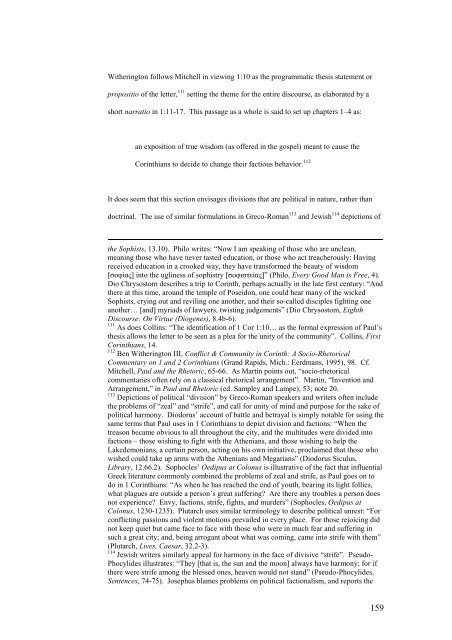PAUL AND THE RHETORIC OF REVERSAL: KERYGMATIC ...
PAUL AND THE RHETORIC OF REVERSAL: KERYGMATIC ...
PAUL AND THE RHETORIC OF REVERSAL: KERYGMATIC ...
You also want an ePaper? Increase the reach of your titles
YUMPU automatically turns print PDFs into web optimized ePapers that Google loves.
Witherington follows Mitchell in viewing 1:10 as the programmatic thesis statement or<br />
propositio of the letter, 111 setting the theme for the entire discourse, as elaborated by a<br />
short narratio in 1:11-17. This passage as a whole is said to set up chapters 1–4 as:<br />
an exposition of true wisdom (as offered in the gospel) meant to cause the<br />
Corinthians to decide to change their factious behavior. 112<br />
It does seem that this section envisages divisions that are political in nature, rather than<br />
doctrinal. The use of similar formulations in Greco-Roman 113 and Jewish 114 depictions of<br />
the Sophists, 13.10). Philo writes: “Now I am speaking of those who are unclean,<br />
meaning those who have never tasted education, or those who act treacherously: Having<br />
received education in a crooked way, they have transformed the beauty of wisdom<br />
[σοφίας] into the ugliness of sophistry [σοφιστείας]” (Philo, Every Good Man is Free, 4).<br />
Dio Chrysostom describes a trip to Corinth, perhaps actually in the late first century: “And<br />
there at this time, around the temple of Poseidon, one could hear many of the wicked<br />
Sophists, crying out and reviling one another, and their so-called disciples fighting one<br />
another… [and] myriads of lawyers, twisting judgements” (Dio Chrysostom, Eighth<br />
Discourse: On Virtue (Diogenes), 8.4b-6).<br />
111 As does Collins: “The identification of 1 Cor 1:10… as the formal expression of Paul’s<br />
thesis allows the letter to be seen as a plea for the unity of the community”. Collins, First<br />
Corinthians, 14.<br />
112 Ben Witherington III, Conflict & Community in Corinth: A Socio-Rhetorical<br />
Commentary on 1 and 2 Corinthians (Grand Rapids, Mich.: Eerdmans, 1995), 98. Cf.<br />
Mitchell, Paul and the Rhetoric, 65-66. As Martin points out, “socio-rhetorical<br />
commentaries often rely on a classical rhetorical arrangement”. Martin, “Invention and<br />
Arrangement,” in Paul and Rhetoric (ed. Sampley and Lampe), 53; note 20.<br />
113 Depictions of political “division” by Greco-Roman speakers and writers often include<br />
the problems of “zeal” and “strife”, and call for unity of mind and purpose for the sake of<br />
political harmony. Diodorus’ account of battle and betrayal is simply notable for using the<br />
same terms that Paul uses in 1 Corinthians to depict division and factions: “When the<br />
treason became obvious to all throughout the city, and the multitudes were divided into<br />
factions – those wishing to fight with the Athenians, and those wishing to help the<br />
Lakedemonians, a certain person, acting on his own initiative, proclaimed that those who<br />
wished could take up arms with the Athenians and Megarians” (Diodorus Siculus,<br />
Library, 12.66.2). Sophocles’ Oedipus at Colonus is illustrative of the fact that influential<br />
Greek literature commonly combined the problems of zeal and strife, as Paul goes on to<br />
do in 1 Corinthians: “As when he has reached the end of youth, bearing its light follies,<br />
what plagues are outside a person’s great suffering? Are there any troubles a person does<br />
not experience? Envy, factions, strife, fights, and murders” (Sophocles, Oedipus at<br />
Colonus, 1230-1235). Plutarch uses similar terminology to describe political unrest: “For<br />
conflicting passions and violent motions prevailed in every place. For those rejoicing did<br />
not keep quiet but came face to face with those who were in much fear and suffering in<br />
such a great city; and, being arrogant about what was coming, came into strife with them”<br />
(Plutarch, Lives, Caesar, 32.2-3).<br />
114 Jewish writers similarly appeal for harmony in the face of divisive “strife”. Pseudo-<br />
Phocylides illustrates: “They [that is, the sun and the moon] always have harmony; for if<br />
there were strife among the blessed ones, heaven would not stand” (Pseudo-Phocylides,<br />
Sentences, 74-75). Josephus blames problems on political factionalism, and reports the<br />
159
















